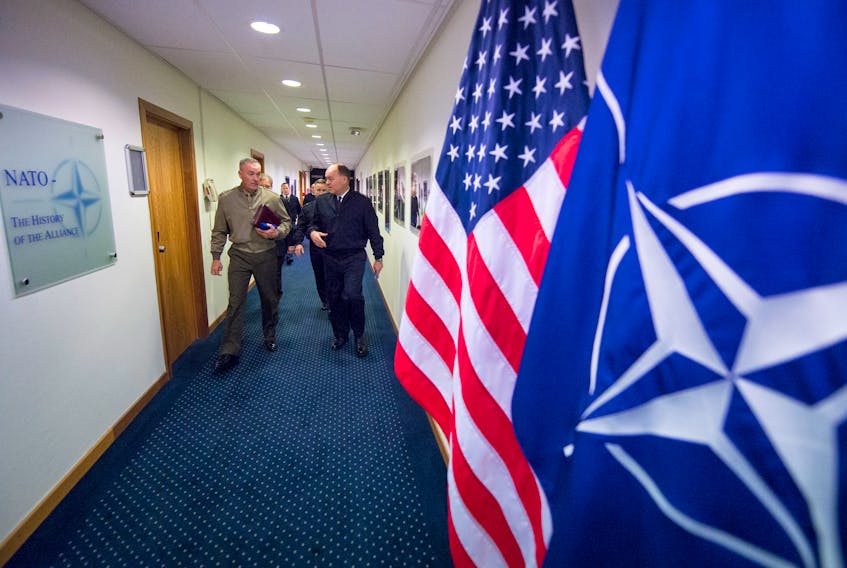TAMARA LORINCZ • Guest Opinion
The most significant multilateral treaty for nuclear disarmament in 50 years came into force on Jan. 22. The United Nations Treaty on the Prohibition of Nuclear Weapons (TPNW) has now been ratified by over 50 countries and signed by more than 80.
The TPNW bans the development, production, storage, transportation, threat of use and use of nuclear weapons. The treaty delegitimizes these indiscriminate weapons of mass destruction and makes them illegal under international law.
However, the 30 countries of the North Atlantic Treaty Organization (NATO) including Canada are refusing to join the TPNW. Since the treaty’s inception, the nuclear-armed military alliance has shamefully tried to thwart it.
In October 2016, the United States Mission to NATO sent a forceful memo to its transatlantic allies to vote against the UN resolution to begin negotiations for the new ban treaty because “nuclear weapons are a core component of NATO’s deterrence and defence posture.”
Ever since NATO’s first strategic concept in 1949, the atomic bomb has been a central capability. More recent strategic concepts and communiqués by NATO headquarters affirm that “nuclear weapons remain the supreme guarantee of the security of the alliance.”
Currently, there are three NATO members — the United States, the United Kingdom and France — that possess a total of 6,305 nuclear weapons. Yet all members of the alliance participate in “nuclear burden-sharing” and are involved in the Nuclear Planning Group.
Five NATO members — Germany, Belgium, Netherlands, Italy and Turkey — host American nuclear weapons on their territory. Further, every member engages in NATO’s annual nuclear strike training, such as STEADFAST NOON, RESILIENT GUARD and SNOWCAT.
In 1983, NATO’s ABLE ARCHER exercise simulated a nuclear attack in such a realistic way that it almost led to a nuclear war with the Soviet Union. Most troubling, since the end of the Cold War, NATO has defiantly moved its soldiers and weapons systems closer to Russia’s border.
Over the past 10 years, NATO has also expanded its ballistic missile defence system (BMD) in Poland, Romania, Spain and Germany. Yet BMD is seen by Russia as a dangerous provocation because it can facilitate a first strike of a nuclear weapon.
It is the constant risk of intentional or accidental use of nuclear weapons and the failure to fulfil the 1970 Nuclear Non-Proliferation Treaty (NPT) that led 122 countries to negotiate a treaty to ban outright nuclear weapons.
Yet, when the treaty negotiations began in the spring of 2017, NATO urged its members to boycott them. Consequently, Canada and the other allies snubbed the meetings, with the exception of the Netherlands. Public pressure forced the Dutch government to participate in the negotiations, but it still voted against the treaty’s adoption.
When the TPNW opened for signature at the UN in September 2017, NATO countries refused to support it. Over the past three years, alliance members have shamefully pressured countries that signed the treaty to withdraw.
For instance, in October, the U.S. sent an intimidating letter to these signatory countries, stating that NATO allies “stand unified in our opposition to the potential repercussions of the treaty.”
Last fall, the alliance launched a disinformation campaign against the TPNW. Misrepresentations were circulated on social media, in a speech by the NATO Secretary General Jens Stoltenberg in November and in a public statement by NATO headquarters in December.
The International Campaign for the Abolition of Nuclear Weapons (ICAN) denounced NATO’s statement as “a slap in the face to the majority of the world’s countries who see the treaty as a positive contribution to peace and security.”
NATO falsely claimed that the new ban treaty undermines the NPT and the International Atomic Energy Agency safeguards. The truth is the TPNW complements and extends the existing non-proliferation and disarmament architecture.
It is NATO’s continued reliance on a dangerous deterrent that is the greatest obstacle to nuclear disarmament.
The new treaty came into existence because the majority of countries do not accept NATO’s irrational and outdated deterrence doctrine. They refuse to live with the intolerable risk posed by these illegal weapons of mass murder.
With the TPNW now in force, NATO countries are nuclear outlaws. Canada should leave the alliance, join the ban treaty and get on the right side of history.
Halifax native Tamara Lorincz is a PhD candidate at Balsillie School of International Affairs at Wilfrid Laurier University in Waterloo, Ont. and member of the Canadian Voice of Women for Peace.









